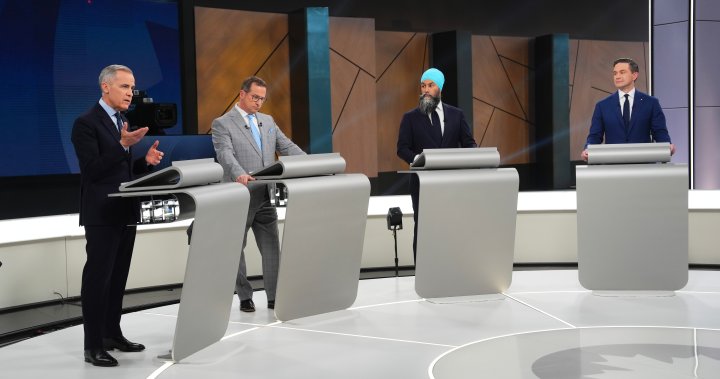In the French language election debate Wednesday night, the four main federal party leaders were asked to lay out policy priorities that have nothing with the United States.
But the conversation quickly turned to the elephant in the room — Donald Trump — and how the leaders would deal with the U.S. president.
The leaders began the debate by sparring over how to respond to the trade war with the United States and pitching themselves as the best one to negotiate with Trump.
Poilievre said that on his first day in office, he would open negotiations with Trump on an agreement put an end to tariffs.
“We can’t control Trump. So at the same time, we need to control what we can,” Poilievre said.
“That means reversing the Liberal economic policies which have weakened our country, unlocking out (natural) resources, cut taxes, bring jobs here to face Trump with strength.”
Liberal Leader Mark Carney said Canada needs to plan for the worst-case scenario and have a strategy to build a stronger economy.
“It’s those elements that will work with Trump. He respects strength, he respects people who know how the world and the private sector works,” Carney said.
“Canada has to create other options, new international trade partners, and that’s what I promise.”
Bloc Québécois Leader Yves-François Blanchet said Canada needs to align with countries that are being affected by U.S. tariffs and “negotiate rationally.”

Get daily National news
Get the day’s top news, political, economic, and current affairs headlines, delivered to your inbox once a day.
“Trump will hang himself with his own cord because his measures are extremely toxic to the U.S. economy,” he said. “In the meantime, he will also create damage everywhere.”
NDP Leader Jagmeet Singh said Canada needs to prioritize what matters most and invest rather than cut.
“Like our agriculture, our culture, our French language; not sacrifice it,” Singh said.
“A profound value for us is taking care of each other. How we do that is reinforcing our health-care system, not Americanizing it.”
The party leaders were also asked which U.S. products they’ve cut from their daily lives.
All other party leaders took a dig at Carney by saying they no longer buy U.S. strawberries. In a recent interview with a Quebec talk show, when asked if he still buys U.S. strawberries, Carney said he doesn’t buy his own groceries.
“No more wine, no more American alcohol,” Carney said.
“I do my own groceries, and I cook myself. So lots of fruit,” Singh said.
“This is a delicious conversation,” Poilievre quipped, adding he buys Canadian beef.
Earlier in the debate, Carney cited his promises to double housing construction, while Poilievre vowed to cut income taxes and the GST on new homes.
Blanchet said Quebec should have the right to run its own economy, using its own natural resources. Singh prioritized health care, noting his party’s efforts to secure dental and pharmacare programs under the previous government.
The first of the election’s two debates is structured around five key topics: the cost of living, energy and climate, the trade war, identity and sovereignty, and immigration and foreign affairs.
The Green party was removed from the debate earlier Wednesday after fielding candidates in less than 70 per cent of ridings.
© 2025 The Canadian Press








